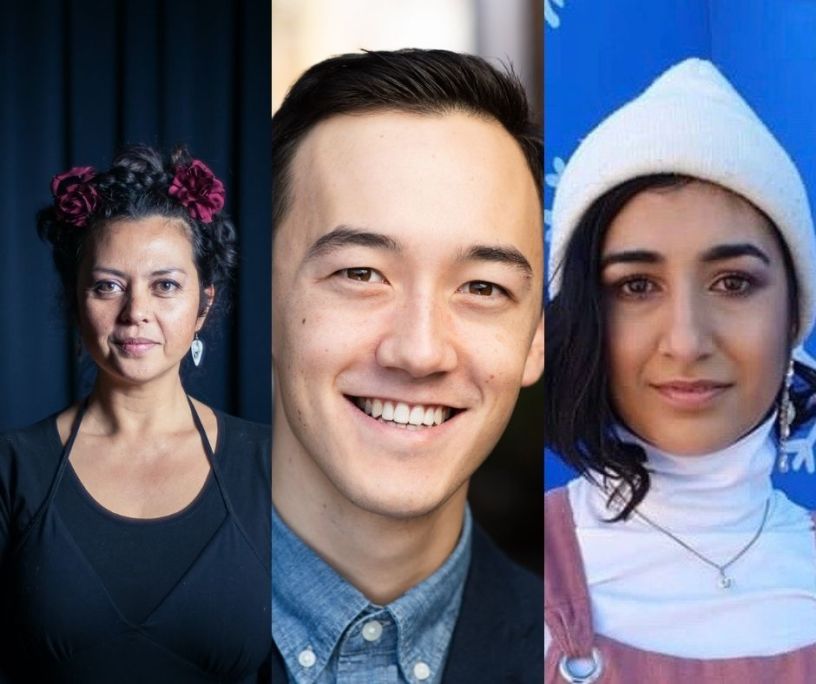Three emerging screenwriters have been awarded production funding of $25,000 each via the AFTRS National Talent Camp skills development program.
AFTRS, Screen Australia, Australian Writers’ Guild, Scripted Ink, and the state screen agencies have announced the funding to assist with pilots or proof-of-concepts for web or TV episodic narrative works.
The recipient projects are Mother Tongue by Queensland’s Katrina Irawati Graham, Melbourne Vice by Victoria’s Kim Ho, and Rules to being a Fuckgurl by South Australia’s Nelya Valamanesh.
AFTRS has worked with the trio since 2019, first in their individual State Talent Camps, and then in the National Talent Camp 2020, where two participants from each state and one from each territory took part in developing their projects and screenwriting skills.
Graham is a writer, director, and emerging playwright with a passion for feminist horror.
Her project Mother Tongue is an 8 x 10min web-series that tells the story of two migrant women, a struggling radical midwife and a gregarious musician, who join forces to transform the lives of new mothers and their babies in Logan (Yugambeh and Yuggera Country), Australia’s most multicultural city.
Coming from a migrant background, Graham said the importance of representation in telling the stories of migrant women and families of colour had always resonated with her.
“My producer Ana Tiwary and I are thrilled to receive further support from AFTRS and the wonderful National Talent Camp program,” she said.
“We have assembled an all Indigenous and woman of colour team to bring this pilot to life.
“We will do our best to create characters and images that people can fall in love with, and which honour the women whose brown hands held us as children and whose legacy lives in our hearts.”
Female representation is also at the centre of Rules to being a Fuckgurl, a 6 x 15-minute comedy/satire web series about the political and social struggles of being an independent woman in her late 20s.
For Valamanesh, an Adelaide (Kaurna Country)-based narrative artist who has developed and produced works on a range of different platforms, including radio programming, DJing, the funding represents a significant step forward for the project.
“Rules to being a Fuckgurl has been in the works for over two years and now it finally feels like it has feet and it will also help me cement myself as a writer and creative in the film and television industry,” she said.
“Being a queer woman of colour, having financial support for a show like Rules to being a Fuckgurl is huge and hopefully, this will be the start of many hilarious and creatively unique shows I can bring to life in the future.”
In Melbourne Vice, university students are imagined detectives, with 6 x 30 crime-comedy web-series merging the crime and coming-of-age genres to dramatise young adults exploring right from wrong.
Ho’s short film The Language of Love screened at over 30 film festivals worldwide, including Sundance and his play Mirror’s Edge won Sydney Theatre Company’s 2018 Patrick White Playwrights Award. Most recently, he co-wrote an episode of the upcoming ABC drama series The Newsreader with creator Michael Lucas.
The Melbourne-based writer said it was a “giddy honour” to be awarded funding from AFTRS.
“The idea for the project has rattled around in my brain since 2015, but it was only through AFTRS’ support that the possibility of realising the project came within reach,” he said.
“National Talent Camp gave me the opportunity to meet with a number of incredible mentors, all of whom helped shape the project in different and surprising ways, as well as tailored workshops to upskill in key areas of the development process.
“This particular kind of heightened-reality, hybrid-genre piece isn’t too common in Australia, so I’ve felt very strongly that making a proof of concept would be crucial in pitching the project to production companies and to networks.”
Dr Romaine Moreton, director of AFTRS’ First Nations and Outreach, said the three recipients had demonstrated “unwavering” commitment to their projects and screen careers throughout the two-year Talent Camp process.
“We are proud to see how far their projects have come since starting this process as State Talent Campers in 2019, and we have no doubt that these screen creatives have bright futures in film and television ahead of them,” she said.


